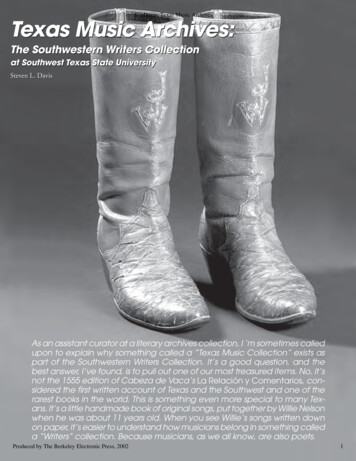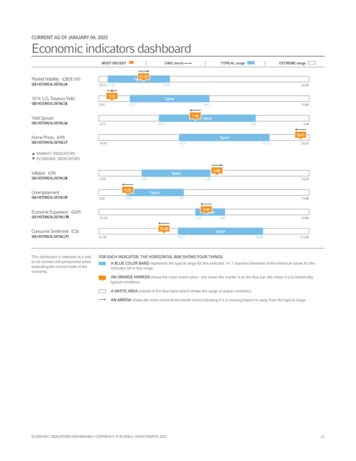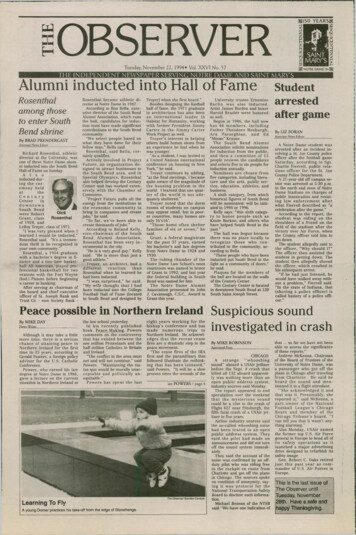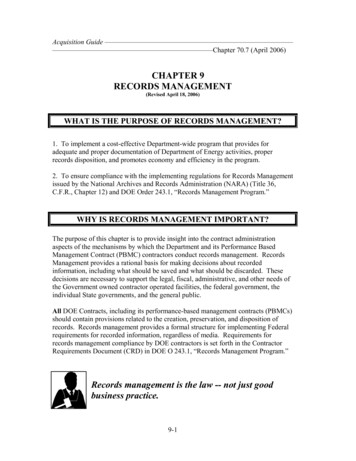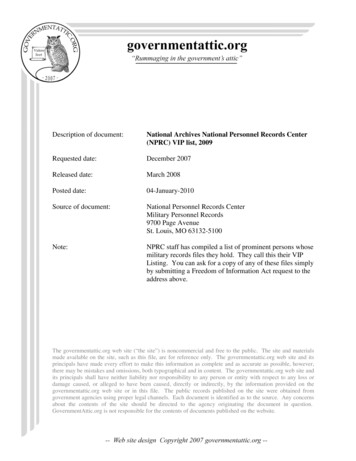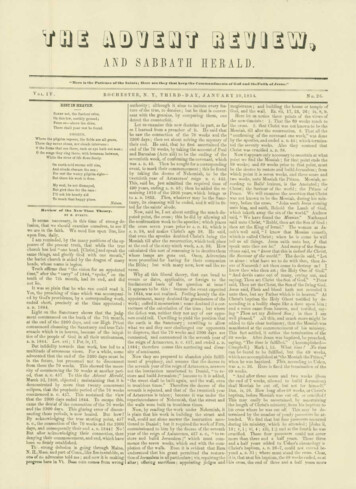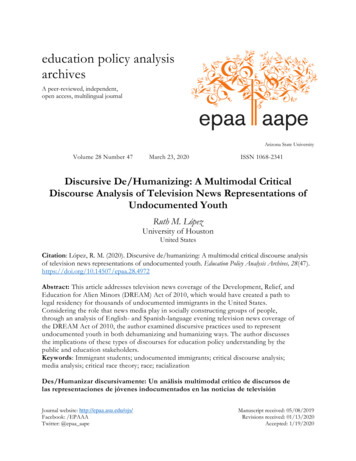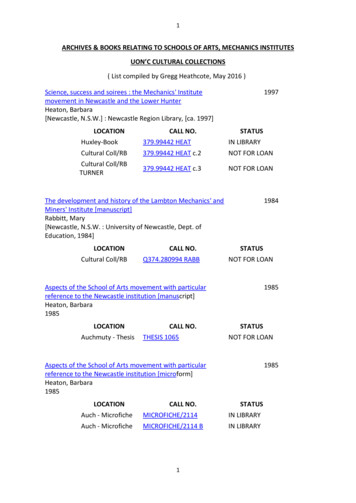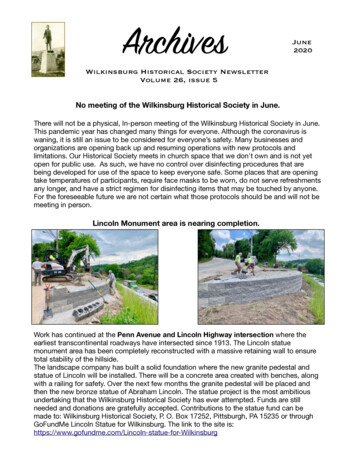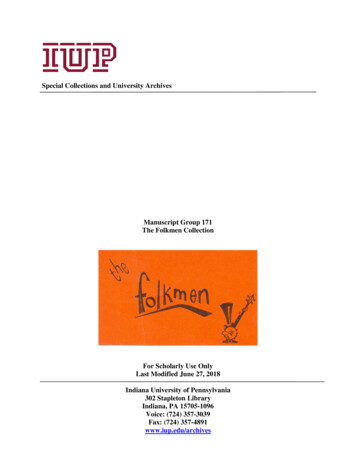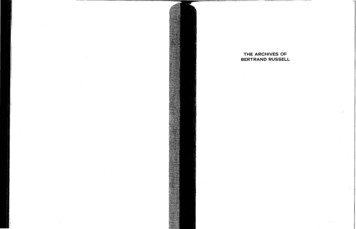
Transcription
THE ARCHIVES OFBERTRAND RUSSELL
a detailed catalogue ofTHE ARCHIVES OF BERTRAND RUSSELLarchive administrator & editorBARRY FEINBERGchief archivistMISS P. M. FISHERarchive & editorial unitDAVID ASHKENNETH M. BLACKWELLRONALD KASRILSproduced & designed byCONTINUUM 1 LTD25 NEWMAN ST LONDON WldirectorsANTON FELTON, RAYMOND HAWKEY
COPYRIGHT 1967CONTINUUM 1 LTDTABLE OF CONTENTSNo portion of this catalogue may be reproduced without permissionfrom the copyrightholdersClassificationIJi&t of PlatesPreface by Bertrand Russell .Introduction .Short Biagraphy/B]b]iographyFamily TreesPage6791116PART ONEIIImAmberley PapersRussell and Stanley FamiliesAutobiography213557PART TWOThis edition is limited to 300 copies of which this is No . . ':-:jf.IVvVIIIXIxrrxmXIVxvXVIManuscripts of Books, Articles and SpeechesManuscripts relating to The Principles of Mathematicsand Principia MathematicaPwbHshers' CorrespondencePhotographs, etc. .Tape RecordingsHonours and Personal DocumentsNewsclippingsMaterial by others than Bertrand RussellBertrand Russell's Library6197101105107113117119133PART THREEVIVIIPersonal CorrespondenceLegal Actions137201PART FOURIXxXlX2x3X4x 5PRINTED IN GREAT BRITAIN BY GOODWIN PRESS LTD LONDON N4X6Political and Social OrganisationsPeace Activities in the Nuclear AgeD.iagram of Peace Activities .1955 Peace ActivitiesThe Pugwash MovementNuclear DisarmamentWorld AffairsHeads of StateBertrand Russell Peace a .341
PLATESBertrand Russell (photograph by Michael Peto)frontispiecefacing pageiLord John Russell to Amberley on B. R's b\rth36iiFrom one of the Amberleys' campaigns ( 1873)37iii12-ye'ar-old Bertie to his brother Frank [reduced]60ivPage 1 of an undergraduate essay written by B. R. in July 1893[reduced]61vviviiviiiixxxixiiOutline of B. R's History of Western Philosophy [reduced]132From a letter to A. N. Whitehead about the MS of PrincipiaMathematica [reduced]133Letter to Lucy Martin Donnelly anticipating his second lecturetour of America [reduced]156Copy of letter to H. Wildon Carr just before B. R's impPisonment in 1918 [reduced]157From the 1907 Wimbledon by-election [reduced]228B. R. requests Einstein's signature to Nobel Scientists' Manifesto [reduced]. (Einstein's signature was his last pub1"cact.)229Draft of telegrams to Khrushchev and Kennedy during theCuban Crisis [reduced]252B. R. addressing mass meeting .in Trafalgar Square, 19612536PREFACEMucH oF MY LIFE has been spent in writing, and some evidence of this is tobe found in the following pages. I have written about seventy books and severalthousand essays and articles. These catalogues, I am told, suggest that I havewritten one letter every thirty hours of my life, nearly all of which have notbeen published. In fact the number was probably much higher than this. Manyof the letters which I have written on behalf of the Bertrand Russell PeaceFoundation are not included here; nor are letters which are confidential. Andwhenever I moved house H was usual for quantities of papers to be burned.Although this all suggests a considerable output, I cannot claim that my penhas been mightier or even busier than other people's swords.I wish to thank the London company of Continuum Ltd for its preparationof these archives. The success of its efforts in identifying over 100,000 items willbe apparent from every page.8.-tt. .(Ff!:,·- oyMarch 16th, 1967.7!i:II',,I
INTRODUCTION,,, ---:&-- THE PRODUCTION of th,is catalogue has been a massive and complex task, andthe task has been the measure of the man it represents. Bertrand Russell'slife's work; his tremendous vitality, industry and manifold interests, his deepinvolvement in every cause he has espoused and every friendship he has formed,were the problem and are the subject of this catalogue. Few men have plumbedsuch a variety of intellectual oceans to such a depth as has Russell.Bertrand Russell is perhaps most widely known as a Philosopher, but notin the peculiarly constricted sense of the word which narrows the philosopher'stask to confrontation with the metaphysical. Russell has never been content tosit back and stare at the stars; he has engaged life face to face, experiencingevery vicissitude and always striving to influence its ever changing shape.Our task has been to seek out and clarify every aspect of his multifariouscareer that Js reflected in these archives. In the more mundane terms of dayto day sorting and classifying, this work may seem to most to be arduous andenervating, relieved only by privileged contact with private papers. But thehumanity of Russell, his strengths and weaknesses, his wit and succinctness ofstyle and the power of analysis ever present in his writing and in the minds ofthose who wrote to !rim, make this no mere archive but a literary tour de force.As our work progressed so we saw emerging four well defined categoriesof Russell's activities. While these sections remain inseparable they are nevertheless complete in themselves; we have therefore dhriided the catalogue into.,four parts.Part One is the historical backdrop for each of the other three sections.Included in it are the Amberley Papers, the collected correspondence ofRussell's parents whom he knew only while an infant but who neverthelessanticipated to a remarkable degree his humanity and radical scepticism. Theircampaigns for Women's Rights and Birth Control in the hey-day of VictorianEngland are paralleled by Russell's own campaign for Women's Suffrage in theearly part of this century and his subsequent involvement in ethical and socialproblems.Up to the 1st World War Russell's work was almost wholly dedicatedtowards making the principles of mathematics more scientific. Thereafter hebecame increasingly interested 'in social as opposed to purely intellectualproblems. Part Two, which lists several hundred manuscripts of his books,articles and speeches, reflects his widening involvement. The books, rangingfrom The Principles of Mathematics and History of Western Philosophy throughSatan in the S1'b1'rbs and Nightmares of Eminent Persons to On Ed1'cationand Unarmed Victory, eloquently testify to his incredible versatility. Also in thissection of the archives are his many honours and awards, and a vast collection ofreviews and articles on Russell and his work which is the world's response to hismonumental effort.Part Three is the most private area of the archive, being his personalcorrespondence with family and friends. The correspondence is remarkableboth for its size (there are some 25,000 letters) and for its richness of content;it includes letters to and from many of the literary, scientific and political giantsof the century. In addition, and in some ways anticipath1g the contents of PartFour, is a section which details Russell's personal defence of ·individuals persecuted because of persuasians of conscience, beginning with his militant supportof pacifism during World War I and includ,ing his more recent activities on9
,-behalf of those whom he considers to have been the victims of injustice.Perhaps the most controversial section is Part Four, as its contents arenot yet adjudicated by the passage of time. The 1950's were a nodal point inRussell's career where, confronted with the imminent dangers of nuclearwarfare, he related his work increasingly to the reality of the day and itsinexorllble problems, translating his concern for mankind into ceaselessinternational activity for peace. The vast correspondence here with politicalfigures and organisations gives a fascinating insight into major events of modernhistory. This section will also serve to highlight for future generations thetortured atmosphere of the years of the Cold War and the 'Balance of Terror'.His deeply felt compassion for humanity has dictated his obsession forindividual liberty and led Russell in th" final analysis to judge all social actionsin terms of the maximum happiness for all of mankind. His work has beendedicated towards achieving this goal, and his great integrity as a man hascompelled him to remain fixed to this principle, even if it meant at timespersonal suffering and even imprisonment. In the same spirit he has neverhesitated to measure himself and his work against this high ideal, and neverflinched from self criticism or admitting errors in Ms public declarations.While Russell's place among the great visionaries of history is undisputed,the reverberations of his recent work tend to ·provoke strong passions ratherthan an objective appreciation of his universal greatness. And yet similarcontroversy surrounded most of Ms past work, and there is much evidencein the archives to show that his current activity extends and develops logicallyfrom his earlier (now respectable) convictions. In this respect the archivesare not only an invaluable historical record, but a tribute to the enduringA SHORT 18901893189418951896courage, integrity and genius of Bertrand Russell.THEEDITOR18971898Born 18 May at Ravenscroft, near Trelleck, Monmouthshire; the secondson of Lord and Lady AmberleyDeath of his mother and his sister RachelDeath of his father. Bertrand and his brother Frank go to live withtheir grandparents Lord and Lady Russell at Pembroke Lodge, Richmond, after the courts reject the guardianship of T. Cobden-Sandersonand Robert Spalding, both being atheistsDeath of his grandfather Lord John RussellTutored in mathematics by his brother. The dawn of religious doubtsRecords in diary his doubts as to the existence of GodStudies at a crammer and wins a minor mathematical scholarship toCambridgeEnters Trinity College, CambridgeObtains 1st class degree in mathematics, begins systematic study ofphilosophyObtains 1st class in Moral Sciences examinations. Appointed attache atthe British Embassy in Paris. Marries Alys Pearsall Smith on return toEnglandTravels to Germany to study economics at Berlin University. MeetsSocial Democrats. On his return wins Fellowship at Trinity with dissertation on ' The Foundations of Geometry '. 2nd visit to Germany.Stucties Social Democratic movement. First published writing: a reviewin MindAppointed 1st lecturer at London School of Economics. Publication ofhis first book German Socia! Democracy. Travels to U.S.A. and lectureson non-Euclidean geometry at Bryn Mawr College and Johns HopkinsUniversity. Member of Fabian Society and Aristotelian SocietyPublication of The Foundations of GeometryInfluenced by G. E. Moore into rejecting the philosophies of Kantand HegelLectures on Leibniz at Trinity College. At first, supports the Britishcause Jn the Boer Warlit ''· ' catibh of The Philosophy of Leibniz. Attends International Con-c'ofP Ilosophy in Pari.s with A. N. Whitehead. Meets Peano, whoser(\vides· him with a technique of logical analysis. Writes first, . The Principles of Mathematics'f' 'F'cCtures oi:t Mathematical Logic at Trinity. Beginnings of PrincipiaMatliematica1902A 'mystic 'insight' changes his views on war and personal relationshipsBegins life-long friendship with Gilbert Murray. Writes The Free Man'sWorshipThe Principles of Mathematics pubHshed19031903-4 Intellectual deadlock over ' Russell's paradox '. Writes and speaks onFree Trade1905Discovers his ' Theory of Descriptions '1906Discovers the 'Theory of Types'. Elected to London MathematicalSociety1907Stands for parliament in Wimbledon by-election, campaigning forWomen's Suffrage and Free Trade, and is defeated1907-10 Working 10-12 hours a day for 8 months in the year on PrincipiaMathematica19081909191010Elected Fellow of the Royal Society. Attends International Congress ofMathematicians in RomeCriticises William James' philosophy of PragmatismPublication of 1st volume of Principia Mathematica. Appointed lecturerin Logic and Principles of Mathematics at Trinity College for 5 years.11
1.,IiI!;,!IIIII'1111'II.Active in politics on behalf of the Liberals but rejected as candidatefor Bedford because of his lack of religion. Meets Lady Ottoline Morrell.Philosophical Essays published1911Break-up of marriage. Lectures at Sorbonne in Paris. Meets W.ittgenstein. Elected President of the Aristotelian Society1912Criticises Bergson's philosophy. Publication of Problems of Philosophyand of 2nd volume of Principia Mathematica. Re-elected President of theAristotelian Society. Presides over a section of International Congressof Mathematicians held at Cambridge1913Beginning of friendship with Joseph Conrad. Publication of 3rd volumeof Principia Mathematica191'4Second trip to U.S.A. Delivers Lowell lectures on Our Knowledge ofthe External World (subsequently published under the same title)while temporary professor of philosophy at Harvard. T. S. Eliot oneof his students there. Public speeches in England against the war.Helps to organise Union of Democratic Control, an anti-war organisation.Herbert Spencer Lecturer at Oxford. Ceases to be a Liberal and becomesa SociaHst1915Delivers course of public lectures in London called 'Principles of SocialReconstruction'. Brief, explosive friendship with D. H. Lawrence.Awarded Nicholas Murray Butler Medal of Columbia University foroutstanding work in philosophy1916Active with the No-Conscription Fellowship. Meets Lady ConstanceMalleson. Open letter to U.S. President Wilson appealing to him to usehis influence to obtain peace. Writes leaflet on ·behalf of an imprisonedconscientious objector; is prosecuted and fined 100. War Office restrictshis movements. Dismissed from lectureship at Trinity. Justice in WarTime and Principles of Social Reconstruction published. Public controversy with Gilbert Murray1916-17 Edits The Tribunal, organ of No-Conscription FellowshipPolitical I eals, containing public lectures banned by the War Office,1917pubhshed m U.S.A. only. Rejoices in Russian revolutions1918Imprisoned for 6 months as a result of an article he wrote for TheTribunal. Writes Introduction to Mathmematical Philosophy and beginsAnalysis of Mind in prison. Delivers public lectures on the philosophyof Logical Atom1sm. Roads to Freedom and Mysticism and LogicpublishedThe war marks a change in Russell's outlook on life. As a result he·becomes increasingly involved in social as opposed to purely intellectualproblems1919Beginnings of relationship with second wife Dora Black. Introductionto Mathem tica! PhUosophy published. Meets Wittgenstein at TheHague to d'lscuss the Tractatus Logico-Philosophus. Public lectures onphilosophy in London. Accepts offer of five-year lectureship in Logicand the Principles of Mathematics at Trinity CollegeLect res at Ba celona: Visi s Soviet Union with Labour delegation,1920has mterv1ew with Lenm. Writes and publishes The Practice and Theoryof Bolshevism. Visits China with Dora Black1921Divorce from Alys finalised. Lectures as professor of philosophy atNational University of Peking. Visits Japan. On return to Englandmarries Dora Black. Birth of his first son John Conrad. Analysis ofMind published. Lectures in London and Manchester on ' InternationalProblems of the Far East'. Resigns from Trinity lectureship withouthaving lectured1922Family life in Sydney Street, Chelsea, and Porthcurno Cornwall. TheProblem of China published. Stands for parliament' in Chelsea asLabour candidate and is defeated. Delivers Moncure D. ConwayMemorial Lecture. Writes Introduction to Wittgenstein's TractatusDaughter Katherine born. The Prospects of Industrial Civilization and1923The ABC of Atoms published. Stands again as Labour candidate inChelsea and is defeated. Delivers paper to Jowett Society, Oxford1924!carus: or the . Future of Science published. Lecture tour in U.S.A.,mcludmg. public debates. Presidential address to Student Union ofLondon School of Economics1219251926What I Believe and The ABC of Relativity published. Volume I of 2ndedition of Principia Mathematica publishedOn Education, especia!!y in early childhood published (in U.S., as Education and the Good Life). Tarner Lecturer at Trinity College on theAnalysis of Matter. Lectures at British Institute of PhilosophyStarts experimental school at Telegraph House, Petersfield. Lecturetour in U.S.A. Delivers lecture on Why I am Not a Christian. PublishesAn Out!ine of Philosophy (in U.S., as Philosophy), The Analysis ofMatter, and Selected Essays of Bertrand Russse!!1928Sceptical Essays published1929Lecture tour in U.S.A. Marriage and Morals publishedConquest of Happiness pll'blished1930Lecture tour in U.S.A. Dictates basis of Autobiography to 1921.1931Becomes 3rd Earl Russell on his brother's death. Begins 4-yearseries of weekly articles for Hearst press. The Scientific OutlookpublishedPublishes Education and the Socia! Order (in U.S., as Education and1932the Modern World). Awarded Sylvester Medal of the Royal Society.President of the India LeagueAwarded the de Morgan Medal of the London Mathematical Society.1933In fortnightly articles for the Sunday Referee, reacts strongly to adventof National Socialism in Germany and also writes on economic causesof the Depression. Champions Roosevelt's domestic and foreign ( especially disarmament) policies1933-4 With Patricia Spence, his research secretary, writes and publishes1927l.Freedom and Organisation, 1814-1914Divorce from Dora Black. Publishes In Praise of Idleness and Religionand Science. Begins research with Patricia Spence for The AmberleyPapers. Decides to regain his philosophical reputation. Elected to 3rdterm as President of the Aristotelian SocietyMarriageto Patricia Spence. Delivers Earl Grey Memorial Lecture.1936Which Way to Peace? published. Advocates pacifism in next war inspeeches and articlesBirth of second son Conrad. The Amberley Papers published. Lectures1937on philosophy at London School of Economics. Discusses foreign affairsin maiden speech in House of Lords. Presidential address to Conferenceof Educational Associations. Introduction to 2nd edition of The Philol#." . , s'!}JliY of;.Lf' ?riiz!-" . t'.::, sJl,'i;; J !:'1 fa11r .f at Vniversit:\' of Oxford on 'Words and Fact:o' an early1935ifaflhtl 2,'{,. w '1jlp,igf ln,qy,iry into Meaning and Truth. Power, a new social ana!yS'ls·pilblish Li:!\IPPorts Britis.h policy at Mu;iich. Intr'?duction to 2nd e ition, . 9f I?ri clples .of Mathematics. Travels with Patricia to U.S.A., appomted · ryisifmg professor of philosophy at University of Chicago and lectureson' Words and Facts'Appointedprofessor of philosophy at University of California at Los1939Angeles. Outbreak of War prevents return of John and Kate to England.Lecture tour of U.S.A.1940Offered professorship at New York City College. Appointment revokedin controversial court case. Delivers William James lectures at Harvard,published as An Inquiry into Meaning and Truth. Declares his supportfor World War II1941-3 Lectures at Barnes Foundation in Pennsylvania on the History ofPhilosophy (these lectures provide the basis of his History of WesterntlJo.Philosophy)194319441945Dismissed from Barnes Foundation - later wins court case claimingbreach of contract by Dr Barnes. Lectures at Rand School of SocialScience on ' The Problems of Democracy 'Friendship with Einstein while at Princeton. On return to Englandappointed lecturer for five years and Fellow of Trinity College. Publication of The Philosophy of Bertrand Russe!!, to which he contributesA History of Western Philosophy published. Predicts development ofhydrogen bomb in speech to House of Lords. Writes Human Knowledge.Campaigns for World Government13
1946Delivers Henry Sidgwick Lecture at Newnham College, Cambridge.Delivers National Book League Annual Lecture1946-8 Frequent lectures. on the continent for such organisations as the NewCommonwealth.1947Attends International Congress of Philosophy in Brussels1948Many broadcasts for the B.B.C. Sent to Norway by British Governmentto induce Norwegians to join alliance against the Soviet Union. HumanKnowledge published. Controversy over his advocacy of threateningU.S.S.R. with atomic weapons1949Delivers 1st Reith Lectures on B.B.C., published as Authority and theIndividual. Awarded Docteur Honoris Causa by the Universite d'AixMarseille. Awarded the Order of Merit by George VI. Delivers LloydRoberts Lecture to Royal Society of Medicine. Lectures at RuskinCollege, Oxford. Expands and updates his Autobiography1950Lectures at the Sorbonne. Travels to Australia as visiting lecturer andthen to the U.S.A. where he lectures at Mt Holyoake College andPrinceton, and gives Matchette Foundation Lectures at ColumbiaUniversity. Awarded Nobel Prize for Literature. Unpopular Essayspublished1951Matchette Foundation Lectures published in U.S.A. as The Impactof Science on Society. New Hopes for a Changing World published.Lecture tour in U.S.A.1952Divorce from Patricia Spence. Marriage to Edith Finch. Expandedversion of Impact of Science on Society published in England. Publiclycriticises increasing illiberalism in America. Elected to AthenaeumClub1953His first book of stories Satan in the Suburbs published1954The Bikini hydrogen bomb tests lead to his ' Mari's Peril ' broadcaston the B.B.C. Human Society in Ethics and Politics and Nightmares ofEminent Persons published. Delivers Herman Ould Memorial Lectureon ' History as an Art '1955Attends: International Congress of Parliamentarians for World Government in Rome; World Assembly for Peace in Helsinki (in absentia);International Congress of the World Movement for World Governmentin Paris; and the World Conference of Scientists in London. Einsteinagrees to sign manifesto on ' Man's Peril '. London press conference onNo'bel Pr.ize scientists' manifesto (known as the Russell-Einsteinstatement)1956Dinner in his honour given by World Government Association atHouse of Commons. Campaigns on behalf of Morton Sobell. Portraitsfrom Memory and Logic and Knowledge published. Condemns Britishintervention in Suez and Russian intervention in Hungary1957Elected President of 1st Pugwash Conference of Scientists from bothEast and West. Wide publication of his Open Letter to Khrushchev andEisenhower urging cooperation between East and West. AwardedKalinga Prize by UNESCO. Publication of The Passionate Sceptic, abiography of Russell by Alan Wood, and of Why I am Not a Christianand Understanding History (in U.S. only). Participates in founding ofCampaign for Nuclear Disarmament. Criticises current trends in Englishphilosophy1958Launches Campaign for Nuclear Disarmament of which he ;g President.Devotes most of his time henceforth to advocacy of nuclear disarmament and .international peace. The Vital Letters of Russell, Khrushchev,Dulles publishedCommon Sense and Nuclear Warfare, Wisdom of the West and My1959PhUosophical Development published1960Addresses C.N.D. demonstration at Trafalgar Square. Resigns fromPresidency of C.N.D. Becomes President of the Committee of 100.Writes pamphlet Act or Perish advocating mass civil disobedience.Awarded the Sonning Prize in Denmark. Bertrand Russell Speaks HisMind published1961Leads mass sit-down outside Ministry of Defence to protest againstBritish Government's nuclear policies. He and his wife sentenced to2 months imprisonment; reduced to one week for reasons of health.14196219631964196519661967Publication of Fact and Fiction, Has Man a Future?, Essays in Scepticism(in U.S. only), and The Basic Writings of Bertrand Russell. ElectedHonorary Fellow of London School of EconomicsHis 90th birthday celebrations include a concert and luncheon in hishonour at the House of Commons. Discussions with U Thant aboutworld nuclear and disarmament policies. Acts as intermediary betweenKhrushchev and Kennedy in Cuban Crisis and between Nehru andChou En-lai in Sino-Indian border conflictPresented with American Emergency Civil Liberties Union's TomPaine Award. Launches Bertrand Russell Peace Foundation, designedto institutionalize his increasing international activ.ity. Increasinglydevotes himself to the war in Vietnam. Unarmed Victory publishedPresident of the British 'Who Killed Kennedy? Committee'. Writesarticles attacking American policies in VietnamResigns from British Labour Party. Deep friendship with Victor Purcellends with Purcell's deathAddresses preparatory meeting of International War Crimes Tribunaland founding conference of Vietnam Solidarity CampaignPublication of Volume I of The Autobiography of Bertrand Russell andWar Crimes in Vietnam15
111:1STANLEY FAMILY TREERUSSELL FAMILY TREE''John RussellCourtier of Henry VIII- given Woburn Abbey,created EarlWilliam, Lord RussellSon of 1st Duke of Bedford - executed 1683 forresistance to StuartsLord John Russell3rd son of 6th Duke of Bedford - twice PrimeMinister to Queen Victoria1st Earl Russell m. 2. Lady Frances Anna Maria Elliot (2nddaughter of Earl of Minto) 20.7.1841John, Lord Amberleyb. 1842 d. 1876m.Kate, daughter of2nd Lord Stanleyof Alderley andHenrietta MariaWilliamRolloSir John Thomas Stanley1st Lord Stanley of Alderleym.Edward John Stanley2nd Lord Stanley of Alderleym.IAgathaHenry John Stanleyb. 1827Maria Josepha Hobroyd(later Dowager Lady Stanley)1826 - Hon. Henrietta Maria(eldest daughter of Viscount Dillon)d. 18959 childrenIAlicem. Col. AugustusLane FoxIBlanchem. Earlof AirlieIMaudeIJohnIIItIJohn Francis Stanley (Frank)b. 12.8.1865 d. 3.3.19312nd Earl Russellm. 1. Mabel Edith Scott2. Mrs Somerville (Mollie)3. Elizabeth, Countess VonArnimIRachelb. 1868d. 1874Bertrand Arthur Williamb. 18.5.18723rd Earl Russellm. 1. Alys Pearsall Smith 18942. Dora Black - 1921I.1John Conrad Katherme Jane192119233. Patricia Helen Spence-1936lIAlgernonIRosalindm. George Howardlater Earl of CarlisleJohn Francis Stanley (Frank)b. 12.8.1865 d. 3.3.1931(became 2nd Earl Russell)Klte b. 1842 d. 1874m. John, Lord AmberleyRachelb. 2.3.1868d. 3.7.1874IConrad Sebastian Robert19374. Edith Finch -195216ILyulphm. daughter ofo.s. of 1st Earl Russell 1864 Sir Lothian Bell17Bertrand Arthur Williamb. 18.5.1872(became 3rd Earl Russell)
PART ONE
ITHE AMBERLEY PAPERSClassification ISECTIONSI1/1 Lord John Russell, 1st Earl Russell1/2 Lady Frances Anna Maria RussellI2/1 Lord Edward John Stanley2/2 Lady Henrietta Maria StanleyI3/13/23/33/43/53/63/7I4/1 Journals, Photographs, Newsclippings, etc.4/2 Miscellaneous CorrespondenceJohn Russell, Viscount AmberleyKate Russell, Viscountess AmberleyFrank Russell (see aiso Section II 3)Correspondence with FriendsPolitical CorrespondenceAmerican CorrespondenceAmberley DeathsINTRODUCTIONJohn and Kate Amberley, the children of Lord and Lady Russell and Lord andLady Stanley of Alderley respectively, created a sensation in Victorian Englandwith their radical views and political campaigns which included ' Birth Control 'and 'The Emancipation of Women'.Their correspondence with family and friends not only gives a fascinatingglimpse into the social life of the latter half of the 19th century, but providesunique documentation of the intellectual and political currents of that age. Thecorrespondence includes letters from many of the most distinguished philosophers, writers and politicians of the period, such as William Lecky, HenryCrompton, Frederic Harrison, T. H. Huxley, Herbert Spencer, Benjamin Jowett,John Morley, Arthur Arnold, John Blackie, etc.A small selection of the correspondence detailed here was edited by B. R.and Patricia Russell and published as The Amberley Papers by Leonard andVirginia Woolf in 1937.I'i21p'
II1/1LORD JOHN RUSSELL (Amberley's father) 1st EarlLord John Russell was twice Prime Minister to Queen Victoria and was responsible for many social reforms, including the Reform Bill of 1832. He died in 1878at the age of 86.From Lord Russell18 Oct 1863 - 18 Oct 1873 193 letters to Amberley and to Kate including a letterdated 21 May 1872 congratulating Amberley on the birth of B. R.16 Nov 1870 1 letter to Frank Russell24 Oct 1865 & Aug 1859 2 letters to Mr Helps (Clerk of the Privy Council) with2 typed copies15 Sep 1863 to Sir Augustus PagetTo Lord Russell29 July 1865 Duke of Bedford to Lord John offering 1,000 towards Amberley'selection campaign in South Devon19 Apr 1863 Clarendon to Lord JohnUndated 17 letters to Lord John from Mrs Moore (Thomas Moore's wife)7 Apr 1852 Thomas Longman (editor, Edinburgh Review) to Lord John re LordJohn editing Thomas Moore's journalsI1/2LADY FRANCES ANNA MARIA RUSSELL (Amberley's mother)From Lady Russell1869 - 1874 370 letters to Amberley and to Kate1866 - 1872 44 letters to Lady Stanley12 Aug & undated 2 letters to Frank(See a!so Section II 1 for letters from Lady Russell to B. R.)II2/1LORD EDWARD JOHN STANLEY OF ALDERLEY (Kate's father)To Lord StanleyUndated from Lansdowne, from L. E. Rees, from Mr Villiers, from Dr Barthfrom M. Garizzi'March - June ( ?) 5 letters from Sir Henry Rawlinson (the famous orientalistwho first deciphered cuneiform)circa 1861 5 letters from Carlisle11 Mar 1861 from Manchester7 !\fay 1862 from S. Hammond10 Aug 1861 & 27 May 1862 2 letters from Viscount Monck enclosing letter fromJ. Chegwyn to Monck.20 Dec 1862 from M. S. Milner Gibson15 July 1861 from R. Murcheson19 July 1862 from Lord Dalhousie18 Mar 1862 from S. Sedgwick22 Aug 1861 from Jamac(?)22 Apr 1862 from Lord Ebury22 Oct 1860 from Bishop of Oxford17 Aug 1861 & 11 Oct 1861 2 letters from Bishop of LondonI2/2To Lady Stanley10 Oct 1867 from Agatha (Amberley's sister)27 July 1867 from Georgy (Amberley's half-sistef)19 Apr 1875 from E. F. Russell ( ?)Undated from Margaret Elliot (Amberley's cousin)25 Feb 1863 from Babbage, the mathematicianUndated from C. Norton14 July 1862 from B. Phipps24 Mar ( ?) from Charles Halle30 Mar 1859 from William Sterling18 May 1864 from Thomas George Knox18 Aug 1870 from Blanche (her daughter)2 Jan 1872 from I. Frederic CherthansUndated from Frederic Leighton, Baron of Stretton, President of RoyalAcademy13 May ( ?) from Henry B. Loch, Baron of Doy lawI3/1AMBERLEYFrom AmberleyUndated to Lady John Russell1864 - 1872 25 letters to Kate1857 - 1873 35 letters to Georgy1870 - 1875 14 letters to Arthur and Laura Russell1864 - 1875 21 letters to Lad
PLATES Bertrand Russell (photograph by Michael Peto) i Lord John Russell to Amberley on B. R's b\rth ii From one of the Amberleys' campaigns ( 1873) iii 12-ye'ar-old Bertie to his brother Frank [reduced] iv Page 1 of an undergraduate essay written by B. R. in July 1893 [reduced] v Outline of B. R's History of Western P
